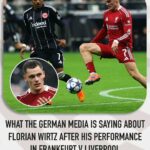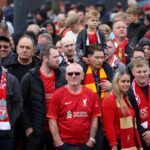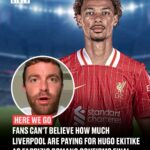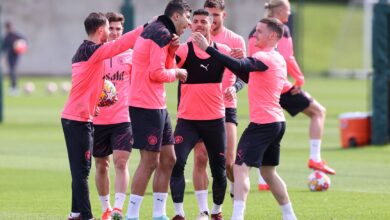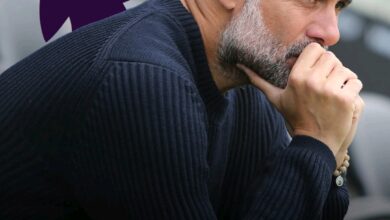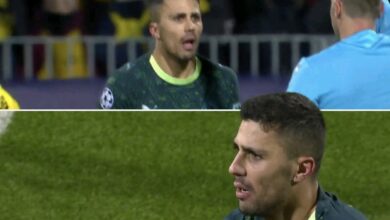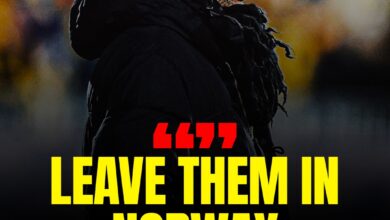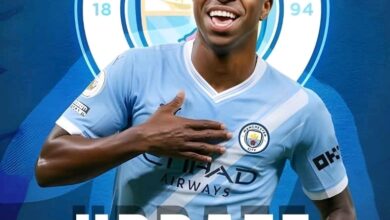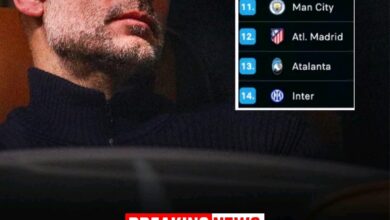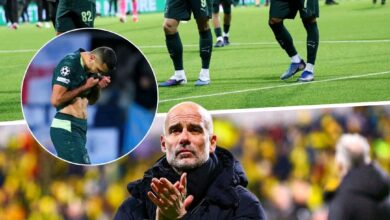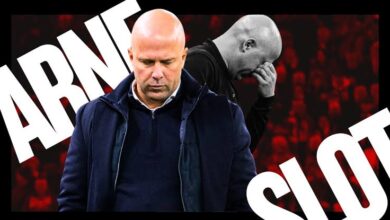Liverpool live match , line up and injury details

On a cold European night, all eyes turned to Germany as Liverpool faced Eintracht Frankfurt in a Champions League clash that carried the weight of desperation. For a club of Liverpool’s stature, losing four games in a row is not just a slump—it’s a full-blown crisis. The reigning Premier League champions, once a team feared across Europe for their relentless pressing and attacking power, suddenly looked fragile. Under new manager Arne Slot, the Reds were searching for answers, unity, and perhaps redemption. And tonight, against a tough German opponent, their response would define the story of their season.
It had been a turbulent few weeks at Anfield. Just days earlier, Liverpool had fallen 2-1 to Manchester United in a fierce Premier League showdown, a defeat that shook both players and fans alike. The loss wasn’t just about three points—it was about confidence. Slot’s men, who started the season with high hopes and title ambitions, suddenly looked uncertain, disconnected, and fatigued. Now, with a Champions League campaign slipping away after defeats to Galatasaray and Atletico Madrid, they found themselves near the bottom of their group. A win in Frankfurt wasn’t just needed; it was essential for survival.
But the troubles didn’t end on the pitch. Their journey to Germany had been chaotic from the start. The team’s plane reportedly suffered a mechanical malfunction, delaying their arrival and preventing Slot from attending his scheduled pre-match press conference. It seemed symbolic—every little thing that could go wrong for Liverpool was going wrong. The timing, the travel, the form—everything felt off. Yet, as the team bus rolled through the Frankfurt night towards the Deutsche Bank Park, one could sense that this was a defining night for the club and their new manager.
Arne Slot knew what was at stake. He was brought in after Jürgen Klopp’s emotional departure to continue the legacy of high-intensity football, tactical brilliance, and success. But the pressure at Liverpool is unlike anywhere else. Four defeats in a row had already led to whispers among the supporters—some questioning his selections, others his tactics. But the Dutch coach appeared calm, even as the storm raged around him. He believed in his players, and he believed that tonight, under the bright European lights, they could find themselves again.
Inside the dressing room, the mood was tense but focused. Captain Virgil van Dijk, one of the most vocal leaders in European football, gathered his teammates and reminded them what wearing the Liverpool badge means. “We’ve been here before,” he reportedly told them. “Liverpool never hides in hard times. We face it head-on.” His voice carried both anger and pride—anger at the recent performances, pride in the club’s history. Around him, the squad nodded in agreement.
One man in particular was determined to prove a point—Hugo Ekitike. The French forward, who had previously played for Frankfurt, was eager to remind his former club of what they let go. But under Slot, his role had diminished. Alexander Isak had taken over as the first-choice striker, leaving Ekitike frustrated and desperate for a chance. Tonight could be that chance—a moment to reclaim his spot and reignite his career.
In midfield, there were more questions. Alexis Mac Allister, the World Cup winner, had struggled for form in recent weeks. His passing seemed less sharp, his confidence low. Slot faced a big decision—whether to keep faith in him or turn to young Curtis Jones or Dominik Szoboszlai for fresh energy. Meanwhile, Andy Robertson was set to return to the starting eleven, bringing experience and grit to the left-back position. His energy and leadership would be vital against Frankfurt’s quick counterattacks.
Liverpool’s opponents, Eintracht Frankfurt, were in no mood to show mercy. The German side had opened their Champions League campaign with a thumping 5-1 win over Galatasaray before suffering the same fate against Atletico Madrid. Their confidence was mixed, but their hunger was clear. Playing at home, in front of a packed and fiery crowd, they saw Liverpool’s crisis as an opportunity.
The Deutsche Bank Park was electric hours before kickoff. German fans waved flags and sang with thunderous energy, while the traveling Liverpool supporters—loyal as ever—made their presence known with chants of “You’ll Never Walk Alone.” It wasn’t just a song tonight; it was a statement of belief.
As the teams walked out under the floodlights, Slot looked on with a mixture of determination and anxiety. He knew that his players needed a spark. A goal, an early moment of brilliance—something to wake them up from their recent nightmare. But he also knew that Frankfurt, with their pace and aggression, could punish any mistake.
The whistle blew, and the battle began. Frankfurt came flying out of the gates, pressing high and testing Liverpool’s defense from the start. Joe Gomez, starting ahead of Ibrahima Konate, found himself under constant pressure. But the Englishman stood tall, throwing himself into tackles and winning crucial duels. Behind him, Alisson Becker barked orders, trying to organize a backline that had looked shaky in recent weeks.
For the first twenty minutes, Liverpool struggled to keep possession. Passes went astray, and the rhythm that once defined their football seemed missing. But slowly, they began to grow into the game. Isak dropped deep to link play, Robertson surged forward on the left, and Mac Allister began to find pockets of space. Then came the first real chance—Mohamed Salah, always the man for big nights, cut inside on his left foot and fired just wide. The roar from the away fans reminded everyone that Liverpool were still alive.
Slot’s men began to press higher, and the game opened up. Frankfurt had their moments too—Alisson was called into action with a flying save after a long-range shot from Hugo Larsson. But Liverpool, sensing vulnerability, pushed harder. The energy, the pressing, the courage—it all started to look familiar again.
By halftime, the score remained goalless, but there was a different feeling in the air. The Reds looked sharper, hungrier. Slot’s halftime talk was passionate—he urged his men to believe again, to remember who they were. “This is Liverpool,” he told them. “You fight till the final whistle. You don’t give up. Ever.”
The second half began with intensity. Ekitike replaced Isak, and it was a move that instantly paid off. The Frenchman’s pace and aggression unsettled Frankfurt’s defense. In the 56th minute, he pounced on a loose ball inside the box and smashed it into the net. The away fans exploded with joy, and Ekitike roared towards them, thumping the Liverpool crest on his chest. It wasn’t just a goal—it was redemption.
Frankfurt responded fiercely, pushing forward in waves. Their captain, Mario Götze, rolled back the years with a clever pass that nearly led to an equalizer. But Alisson, ever dependable, made another crucial save. The home crowd tried to lift their team, but Liverpool’s defense held firm. Van Dijk marshaled his backline with authority, Robertson covered every blade of grass, and Mac Allister began dictating the tempo from midfield.
As the game entered its final stages, the tension was unbearable. Frankfurt launched one last attack, and the ball fell kindly to their striker inside the box. He struck it cleanly—but Alisson’s outstretched hand denied him. The Brazilian’s save was world-class, the kind that defines seasons. Seconds later, the final whistle blew, and the Liverpool players collapsed in relief.
It wasn’t just a win. It was a statement. After four painful defeats, Liverpool had finally fought their way back. The 1-0 victory in Frankfurt might not erase their earlier struggles, but it gave them something priceless—belief.
Arne Slot walked onto the pitch after the whistle, shaking hands with his players, his expression one of quiet satisfaction. He knew there was still work to do. But tonight, he had seen heart, discipline, and unity. The fans who had traveled all the way from England sang louder than ever. “You’ll Never Walk Alone” echoed through the German night, a sound of defiance and pride.
Back in the tunnel, Slot spoke to reporters with calm confidence. “We showed character,” he said. “This is what I want from my team. We know we can play better, but tonight was about fighting for each other. That’s what Liverpool is.”
As the players boarded their flight back to Merseyside, the atmosphere was different. The laughter returned. The doubts eased. They knew the road ahead would still be long, but they had taken the first step towards redemption.
Liverpool may still have problems to fix—injuries, form, tactical adjustments—but the spirit that defines them is still there. And in football, sometimes one night, one goal, and one victory can change everything.
The Champions League journey continues, and so does Arne Slot’s test as Liverpool manager. But after the storm, comes a little light. And for Liverpool, that light shone brightly in Frankfurt.
It wasn’t a perfect performance. It wasn’t even a dominant one. But it was brave, emotional, and defiant—the Liverpool way. The crisis may not be over, but the fight has returned. And as long as that remains, so does the hope that this famous club will rise again.


